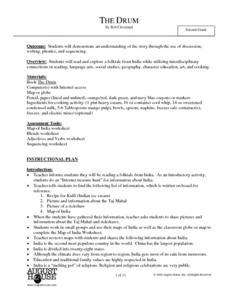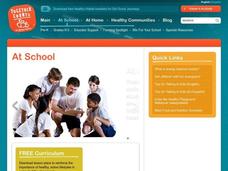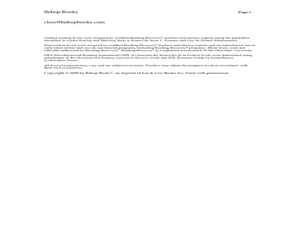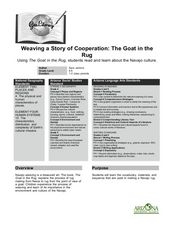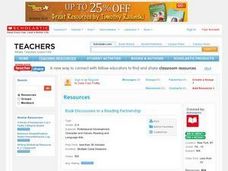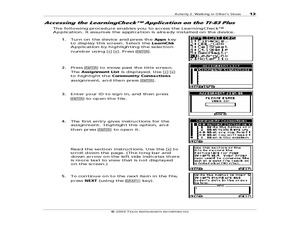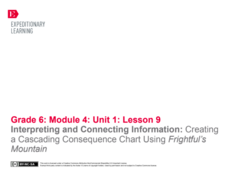University of Minnesota
Whose Choice Is It Anyway?
Your taste buds may be saying Pepsi, but your brain is saying Coke! By analyzing experimental research, learners discover ways in which our brains impact decision making. They conclude with a discussion of neuromarketing and how it...
Curated OER
Reading Connected Text Fluency (Passage)
Practice makes perfect when it comes to reading fluency! Walk your emerging readers through a familiar passage, slowly pointing to each word to keep every learner with you. While looking at a projected passage, scholars read one word at...
Curated OER
Phonics: Decoding Words in Connected Text
Decoding words in connected text can make emergent readers really feel like they are great readers. They work as a class to sound out simple cvc words located in super short sentences. Tip: Extend this activity by having a variety of...
The New York Times
Collateral Damage? Researching a Connection Between Video Games and Violence
Hook your class into an exploration of and discussion about violence in video games with a cute animal clip and a video game trailer. After a quick discussion about how media can affect mood, class members read a related article and...
Curated OER
Connect the Spheres: Earth Systems Interactions
Is everything really connected? Take your class on a walk outside, where they will make observations and write them down on a worksheet. Once they are back in the classroom, learners will work to determine if and how things like birds,...
August House
The Drum
Take a journey to India with a read aloud of The Drum: A Folktale from India by Rob Cleveland. Make connections to the story's theme by building and practicing drums, role playing story characters, and practicing skills in phonics, math,...
Kenan Fellows
Making Connections with Water Quality
What's in your water? And, why is water quality so important? Enhance your class's level of water appreciation through a lesson that demonstrates the necessity of water quality. Environmental enthusiasts explore the EPA's Clean Water...
Curated OER
Introduce Vocabulary: How to Make an Apple Pie and See the World (Priceman)
Ask budding readers, "How do you make an apple pie?" You may get many answers, but Marjorie Priceman takes the cake with her idea in How to Make an Apply Pie and See the World, an adventurous tale full of wonder and new vocabulary. Using...
Curated OER
Making Active, Healthy Lifestyle Choices
Making wise lifestyle choices means making decisions that will positively impact overall health. Help young learners identify active, healthy choices with a collage project in which they cut out pictures from magazines depicting healthy...
EngageNY
Interpreting the Graph of a Function
Groups sort through NASA data provided in a graphic to create a graph using uniform units and intervals. Individuals then make connections to the increasing, decreasing, and constant intervals of the graph and relate these connections...
EngageNY
Building Background Knowledge: The Dinka and Nuer Tribes Until the Mid-1980s (“Sudanese Tribes Confront Modern War” Excerpt 1) (Version 1)
Readers consider comparisons between the Dinka and Nuer tribes in South Sudan, making connections between an informational article about Sudanese tribes and the novel A Long Walk to Water by Linda Sue Park. They annotate the text to help...
Curated OER
Decision Making Skills and Goal Setting
In need of a scripted lesson anyone can deliver? Along with a teaching script, you'll find several scenarios for learners to consider. They'll discuss decision making and goal setting as they relate to each scenario. Guiding worksheets...
Facing History and Ourselves
Citizen Power Makes Democracy Work
Eric Liu's formula "power plus character equals citizenship" and his three strategies to making change happen model for high schoolers how to develop citizen power, how to get involved and participate to make democracy work. Class...
American Chemical Society
What Makes it Rain?
Clouds come alive when curious minds create rain in an action-packed activity. Scholars view a video of rain and analyze an image of water uses to generate a class discussion leading into a hands-on exploration. Using a set of...
Curated OER
What Do You See at the Pond?
With What Do You See at the Pond?, young readers explore pond life and practice reading strategies. Learners first make predictions and then read the simple story independently. After a second read-through with a partner, kids come...
Curated OER
Weaving a Story of Cooperation: The Goat in the Rug
Weaving is an important part of Navajo culture. Read The Goat in the Rug to your fourth and fifth graders, and give them a glimpse into the process of rug making from the point of view of a goat! They will learn new vocabulary words and...
Curated OER
Making Change
Learners investigate how to make change when purchasing items. In this making change lesson, students examine a scenario to calculate the correct change. Learners play Bingo based on information and calculations to determine the amount...
Curated OER
Book Discussions in a Reading Partnership
Do you have a lot of different reading levels in your class? Pair kids up by level and have them choose a book to read independently. They will make predictions, ask questions, make connections, etc. Consider creating a general reading...
Curated OER
Making Connections between Robert Frost's Life and His Poetry
Become acquainted with Robert Frost's life in order to allow your class to fully appreciate how his background influenced his poetry. They analyze specified poems in relation to theme, setting and the use of imagery.
Curated OER
Using Drama to Examine Communities: Walking in Others' Shoes
Encourage your readers to make connections between texts with this resource. After compiling notes for each text read (you choose the texts), groups craft skits in which major characters from each text meet. There is a rubric for the...
EngageNY
Interpreting and Connecting Information: Creating a Cascading Consequence Chart Using Frightful’s Mountain
Decisions, decisions. Scholars take a close look at making decisions by discussing the character Sam in chapters one through eight of Frightful’s Mountain. Partners discuss whether Sam should interact with Frightful and then complete a...
TED-Ed
The Silk Road: Connecting the Ancient World Through Trade
Introduce learners to The Silk Road, the first world-wide web. The narrator of this short, animated video traces the pioneers of globalization and the impact they had on culture and economy. The Scythians, Darius the First, and Alexander...
West Contra Costa Unified School District
Connecting Graphing and Solving Absolute Value Equations and Functions
Can you solve an equation graphically? Absolutely! This Algebra II lesson makes the connection between solving an absolute value equation and graphing two functions. Graphing absolute value functions is presented through the process of...
EngageNY
Text-Dependent Questions Text-Dependent Questions and Making a Claim: Digging Deeper into Paragraphs 12–14 of Steve Jobs’ Commencement Address (and connecting to Chapter 9)
Readers draw connections between Bud, Not Buddy and Steve Jobs' 2005 Stanford University commencement address and cite evidence from the two texts to support their analysis.







